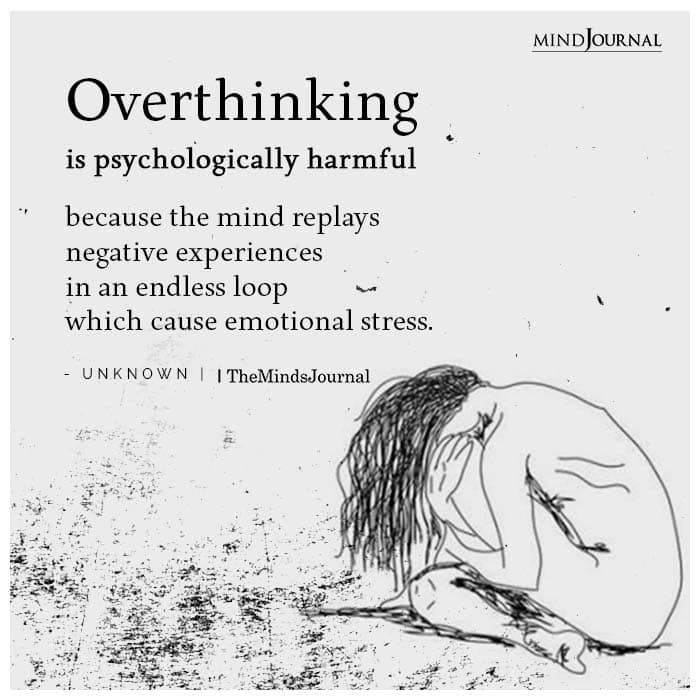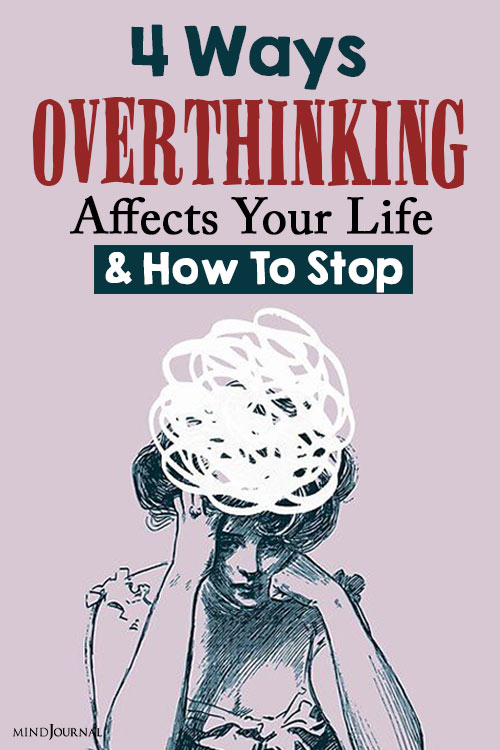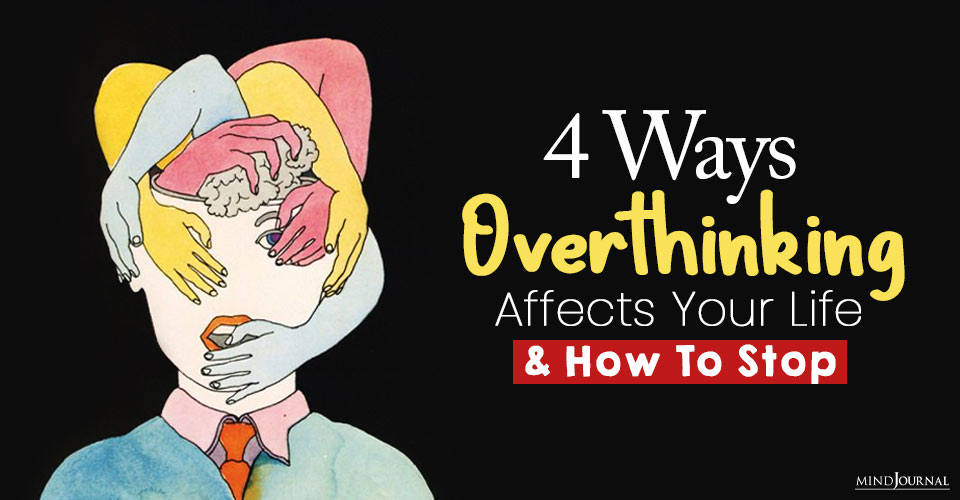Overthinking never feels good, nor does it actually help you in any way. Here’s how overthinking affects your life.
“A mind too active is no mind at all.” -Theodore Roethke
Although overthinking is something many of us (hello! me) do, it’s important to be aware of the negative impact it can have on our lives that can get swept under the rug and normalized. Overthinking can feel like torture and, if chronic, can greatly chip away at the quality of our lives. It can numb out joy and make us feel incredibly alone. It can create strain in our relationships or even cause them to destruct depending on the degree of our overthinking and assuming ways.
What I’m going to do in this post is offer some insight and perspectives to help you become more aware of your over-analyzing ways so you can ditch these destructive thinking habits and work toward becoming more present.
I specifically use the word “present” because “being present’ is on the opposite spectrum of overthinking. When we’re “in our heads” (overthinking) we’re absolutely not present. One main tool to combat overthinking is to find ways that help us to BE in the moment. This post is for you to discover and create ways to do just that.
Related: Cultivate Presence: How To Practice Being Present In Your Life
4 Symptoms Of Overthinking: How overthinking affects you
1. You Feel Less Joy
When you’re overthinking you’re not in the present moment. This is based on the mere fact that you can’t be in two places at once. If you find yourself consistently forgetful about details of your environment and the people in it, chances are that you’re preoccupied with the world going on in your mind.
If your goal is to be happy what I can tell you with 100% confidence is that you will not find happiness by overthinking. On the contrary, a racing mind repels happiness.
Here’s what else is important for you to know. Overthinking is a bad habit and habits can be changed. I know several people who I’ve worked with that believed that there was nothing that they could do about their overthinking because it “is just the way they are”
Not true, my friend.
You are not your overthinking. It’s not in control of you. (Unless you allow it to be.) It’s actually the opposite: Overthinking is a habit that you can get a handle on and as you do your life will change for the better.

2. Your Relationships Are Feeling Disconnected
Have you ever spent time with someone who was clearly not present? Fun, right? Kidding.
It can be incredibly frustrating to be with someone who is truly not with you because they’re caught in the intricacies of their mind.
When you’re out and about in life and spending time within your relationships, but not really “there,” the level of connection, presence, bonding, authenticity, and overall joy is compromised.
A healthy relationship requires two people to show up fully in order to play and engage with each other. This is merely impossible when one party (or both) is not present.
I understand that we’re not perfect beings and sometimes we might have a day when our mind is in LA LA land (normal.) However, if “checked out” becomes a consistent state, there’s more to look at here. Your relationships will be at stake if just fragments of you continue to show up within your connections.
Related: Discover Your True Authentic Self
3. You Chronically Feel Exhausted
It takes a lot of mental energy to overthink. Over time one of the main side effects of chronic overthinking is physical exhaustion. If you feel constantly exhausted without any sort of explanation as to why, it could be your racing mind that’s leading you to feel so drained.
4. You Can’t Sleep
This point is pretty straightforward. Your thoughts can be keeping you from initially getting to sleep or waking you in the wee hours of the morning and sabotaging your ability to rest peacefully. As many of us may know, a lack of sleep leads to so many other issues.
Now that we’ve discussed some symptoms that are present when we’re in our heads, let’s look at 6 practices to help rewire our thinking patterns.
6 Practices To Help Rewire Our Thinking Patterns
1. Engage with people that can help you rediscover your presence.
Having relationships in your life that guide you toward rediscovering your presence is priceless. The mere modeling of being on the other end of someone who knows how to tap into the present moment will, over time, shift you into a more present person yourself.
(Reminder: We do become more like the people who we choose to be around consistently. Choose wisely. Their habits will become your habits over time.)
Look for these present people in your world, value them and hang around them as much as you can.
Related: Why Your Friends Are More Important Than You Think
2. Focus on Facts Not Stories (This is a big one)
This one is pretty cut and dry. A fact is a fact. It’s “what is,” for worse or for better. A fact is the truth of what’s happening or what has happened; It’s not your assumption or story about it. A story is your creative twist and takes on a situation, which is not a fact. (Phew! Got that?)
Becoming more savvy by distinguishing the difference between when you’re reacting based on your story vs. the fact of the matter will greatly silence your tendency to overthink.

3. Practice the Cognitive Behavioral Method of “Thought Stopping” (With Acknowledgment of Your Emotionality)
Finding awareness of when you begin to “go down the rabbit hole” with looping thoughts, rumination, and overthinking is key to thought stopping. What I’m doing in session with my clients who overthink is modeling thought stopping by guiding them away from their unhealthy habit of creating stories.
I do this by identifying the emotion (commonly anxiety or fear) leading the overthinking and proceeding to shut down the “story” that they’ve created, which is driving their looping thoughts. It’s as if I’m picking out weeds from the grass. I’m picking out what we need to work through (the emotion) while ditching the false story, which is often what’s creating the discomfort and pain.
We usually are reacting more from our fear and story of what might be, rather than what actually is.
As you learn to do this with yourself, over time you will stop getting into destructive thinking loops that lead you to nowhere and you will learn to disengage from your assumptions. You will have so much more time for what is pleasant and true when your awareness increases around your ruminating habits. Discover more details about the thought-stopping process here.
4. Move your body
In order to be a healthy person, finding a way to be active and get your blood pumping is a must. There’s very few things that I’m ever going to tell you is a must, and this is one of them.
Through movement and breath, we can help difficult emotions and stress “push through” our system. Without movement, we become stagnant and stuck and start holding onto hard emotions that can literally make us sick. Move your bodies friends. It’s huge.
Related: 9 Ways How Simple Morning Exercise Can Boost Your Productivity
5. Get Curious/ Get Away From What You Know
Whether it’s an intentional trip to a different part of your town that’s unexplored, a weekend trip somewhere new, or traveling outside of the country, please go toward the unknown.
This is important because when we go toward our curiosity, we simultaneously go away from our routine and what we know. Our presence is required when we’re not familiar with our surroundings, which automatically gets us out of our heads and into our lives.
6. Find Some Healthy Distractions
Find ways to engage in activities that help your mind focus such as crossword puzzles, a game of chess, reading, engagement in a good film, etc. These activities are like mind aerobics and help focus your mind on something that squashes the tendency to ruminate, loop, or overthink. Our brains need to exercise too.
All and all, the biggest takeaway that I want you to know is that you can do something about your overthinking. If your mind has a hold of you, this is not the way you have to keep living your life. You are not stuck. Finding relief from overthinking is a matter of finding the right “tools.” With awareness, practice, a desire for change, and the commitment to “do the work,” over time you will find relief from your hyper analyzing ways.
If you feel like you need more guidance toward combating your negative thinking habits there are many different ways to search for a therapist and find the right “fit” for you. Check out my post on How to Find the “Right” Therapist for more pointers toward a successful search. Also, feel free to reach out to me with any questions or directions. I’m happy to help.
Cheers!
Find my youtube video on overthinking HERE.
Written By Kim Egel Originally Appeared On Kim Egel











Leave a Reply